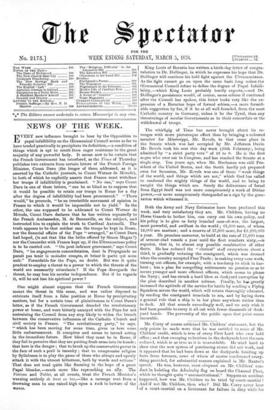One might almost suppose that the French Government meant the
threat in this sense, and was rather disposed to extricate itself from a false position at Rome by precipitating matters, but for a certain tone of plaintiveness in Count Daru's letter, as if the French Government dreaded the revolutionary power at home, and were bitterly annoyed with the Pope for not restraining the Council from any step likely to widen the breach between the conservative influences of the Catholic Church and civil society in France. "The revolutionary party," he says, "which has been moving for some time, gives us here some little embarrassment. It conspires and seems to intend acting in the immediate future. How blind they must be in Rome, if they fail to perceive that they are putting fresh arms into its hands ; that here is the danger ; that to break up the conservative power in the face of such a peril is insanity ; that to compromise religion by Syllabuses is to play the game of those who always and openly attack it with the utmost bitterness, both by words and actions." That does not read quite like finessing in the hope of a great Papal blunder,—much more like reproaching an ally. The Vatican and Tablet, at all events, treat the French Minister's warning entirely de haut en bas,—like a message sent from a drowning man to one raised high upon a rock to beware of the waves.


































